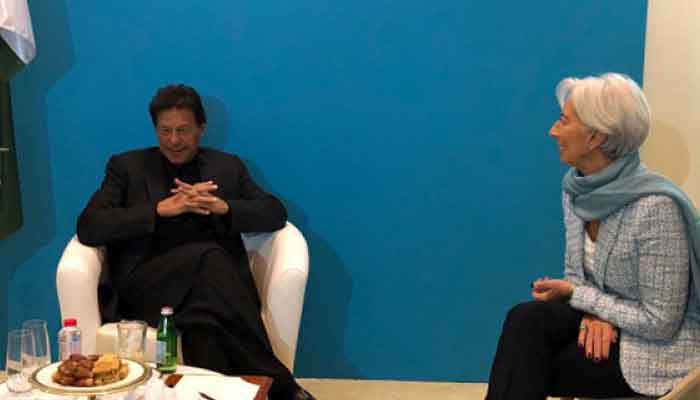‘Pakistan, IMF agree on policy direction’
SBP Governor said investment commitments made by Pakistan’s friendly countries have given the country some cushion to withstand external headwinds, and “also bode well for growth and employment opportunities”. “The foremost step required is to arrange external funding to meet the financing gap.”
Highlights
- Pakistan and IMF have generally reached an agreement over the bailout program
- SBP Governor: current account deficit is likely to narrow further
- The economy is going through a phase of transition: Bajwa
KARACHI: Pakistan and International Monetary Fund (IMF) have generally reached an agreement over the bailout program to meet the financing gap, but timing and pace of stabilisation policies are under discussion, SBP Governor said on Monday.
“There is a general agreement regarding the policy direction between us and the IMF; the differences are only on the timing and pace of stabilisation policies,” Governor State Bank of Pakistan (SBP) Tariq Bajwa said. “The government is continuously negotiating to get a program that can avoid a hard landing for the economy.”
Bajwa was addressing the Bloomberg Pakistan Economic Forum, a statement said.
SBP Governor said investment commitments made by Pakistan’s friendly countries have given the country some cushion to withstand external headwinds, and “also bode well for growth and employment opportunities”. “The foremost step required is to arrange external funding to meet the financing gap.”
Bajwa said current account deficit is likely to narrow further on the back of a deceleration in imports of goods and services and robust workers’ remittances. “The early-harvest CPEC (China-Pakistan Economic Corridor) projects aimed at eliminating structural bottlenecks in the economy are near completion.” Current account deficit declined 22.6 percent year-on-year during the first eight months of FY2019 and was only $356 million in February.
SBP Governor said it will be challenging to achieve sustainable high growth without high savings, increasing revenue generation and reducing trade gap in the economy that experienced “a spell of rising GDP growth between FY2014 and FY2017”.
“Pakistan’s economy is set for a calibrated moderation (as) a result of the high fiscal and CAD (current account deficit), which was registered in FY2018,” he said. “The economy is going through a phase of transition. Stabilisation policies are in place to ensure a stable macroeconomic environment, which is vital for economic development. Bajwa, however, said the government is pursuing wide-ranging reforms to improve the ease of doing business in the country and minimise the cost of stabilisation measures.
SBP Governor said the economy must brace for an initial slowdown before it gets back on the recovery track. The consumer price inflation is projected to fall in the range of 6.5 to 7.5 percent for FY2019. CPI inflation for February has reached 8.2 percent, with July-February average inflation at 6.5 percent. Raw material costs for businesses have moved up because of higher oil prices and exchange rate depreciation, and financing cost has also escalated. “The correction in the exchange rate shall make production in many sectors more competitive and encourage new ventures in import substitution,” he said. “The market-driven PKR (rupee) depreciation has allowed the domestic goods and services to compete more favourably in the international markets.” The rupee has moved 31 percent against the dollar since January 2018.
SBP Governor underscored a need for taking the tax-to-GDP ratio to at least 15 percent. “Without this a primary and revenue surplus will be a mirage,” he said.
-
 Walmart Chief Warns US Risks Falling Behind China In AI Training
Walmart Chief Warns US Risks Falling Behind China In AI Training -
 Wyatt Russell's Surprising Relationship With Kurt Russell Comes To Light
Wyatt Russell's Surprising Relationship With Kurt Russell Comes To Light -
 Elon Musk’s XAI Co-founder Toby Pohlen Steps Down After Three Years Amid IPO Push
Elon Musk’s XAI Co-founder Toby Pohlen Steps Down After Three Years Amid IPO Push -
 Is Human Mission To Mars Possible In 10 Years? Jared Isaacman Breaks It Down
Is Human Mission To Mars Possible In 10 Years? Jared Isaacman Breaks It Down -
 ‘Stranger Things’ Star Gaten Matarazzo Reveals How Cleidocranial Dysplasia Affected His Career
‘Stranger Things’ Star Gaten Matarazzo Reveals How Cleidocranial Dysplasia Affected His Career -
 Google, OpenAI Employees Call For Military AI Restrictions As Anthropic Rejects Pentagon Offer
Google, OpenAI Employees Call For Military AI Restrictions As Anthropic Rejects Pentagon Offer -
 Peter Frampton Details 'life-changing- Battle With Inclusion Body Myositis
Peter Frampton Details 'life-changing- Battle With Inclusion Body Myositis -
 Waymo And Tesla Cars Rely On Remote Human Operators, Not Just AI
Waymo And Tesla Cars Rely On Remote Human Operators, Not Just AI -
 AI And Nuclear War: 95 Percent Of Simulated Scenarios End In Escalation, Study Finds
AI And Nuclear War: 95 Percent Of Simulated Scenarios End In Escalation, Study Finds -
 David Hockney’s First English Landscape Painting Heads To Sotheby’s Auction; First Sale In Nearly 30 Years
David Hockney’s First English Landscape Painting Heads To Sotheby’s Auction; First Sale In Nearly 30 Years -
 How Does Sia Manage 'invisible Pain' From Ehlers-Danlos Syndrome
How Does Sia Manage 'invisible Pain' From Ehlers-Danlos Syndrome -
 Halsey Mentions How She 'gained Control' Over Endometriosis Condition
Halsey Mentions How She 'gained Control' Over Endometriosis Condition -
 Teyana Taylor Says Choosing Movies Over Music 'dumb' Choice?
Teyana Taylor Says Choosing Movies Over Music 'dumb' Choice? -
 Poland Joins Spain In Move To Ban Social Media For Children Under 15
Poland Joins Spain In Move To Ban Social Media For Children Under 15 -
 Shia LaBeouf Sent To Rehab For Not Taking ‘alcohol Addiction Seriously’
Shia LaBeouf Sent To Rehab For Not Taking ‘alcohol Addiction Seriously’ -
 ‘Stingy’ Harry, Meghan Markle Crack Open A Chasm Despite Donation: ‘Do So At Your Own Peril’
‘Stingy’ Harry, Meghan Markle Crack Open A Chasm Despite Donation: ‘Do So At Your Own Peril’




